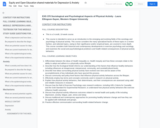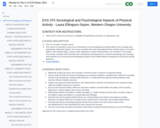
This course is intended to serve as an introduction to the emerging and evolving fields of the sociology and psychology of physical activity. This course considers the many specialized facets of these topics in a review fashion, and selected topics, owing to their significance and/or empirical basis, are covered in more depth. This course considers both historical and contemporary developments in exercise psychology and sociology, and examines the social and psychobiological predictors and health-related consequences of physical activity behaviors.
FULL COURSE LEARNING OBJECTIVES
Differentiate between the ideas of Health Inequality vs. Health Inequity and how these concepts relate to the ability to adopt and adhere to a physically active lifestyle.
Describe how the Ecological Model informs our understanding of the factors that influence healthy behaviors including influences at intrapersonal, interpersonal, community, and societal/cultural levels.
Describe how ideas surrounding physical activity have evolved over time and be aware of the accomplishments of key individuals who have spurred this process.
Discuss community and policy-level factors that influence physical activity behaviors across the lifespan.
Effectively employ key terms and concepts commonly used in research on physical activity.
Explain how physical activity behaviors, their determinants, and their consequences are assessed using valid and reliable measures in research.
Discuss how the field of Exercise Psychology uses research evidence, including Hill’s Criteria for Causality and the Gold Standard for Experimental Research, to understand how physical activity behaviors like exercise influence health outcomes.
Discuss how physical activity influences outcomes related to mental health and quality of life including depression, anxiety, fatigue, pain, stress and sleep.
Discuss traditional and contemporary approaches for promoting healthy behavior change and how they can be applied with individuals and groups.
Practice effective communication surrounding health-related behavior change.
- Subject:
- Applied Science
- Health, Medicine and Nursing
- Social Science
- Material Type:
- Module
- Author:
- Laura Ellingson-Sayen
- Date Added:
- 11/29/2021
